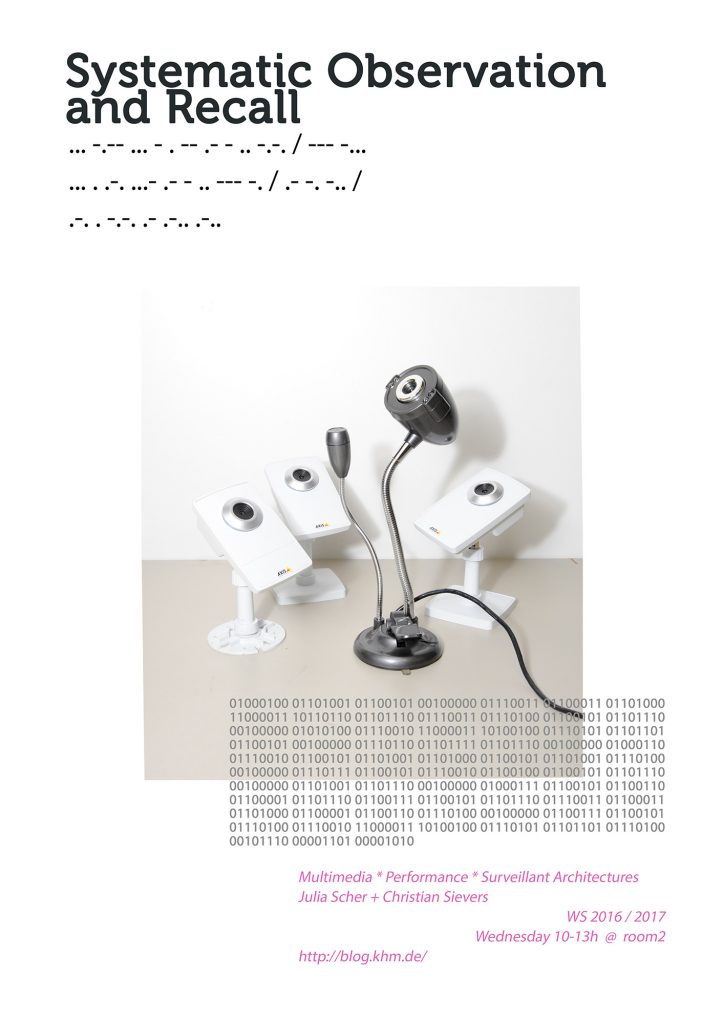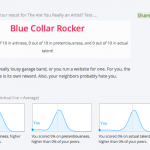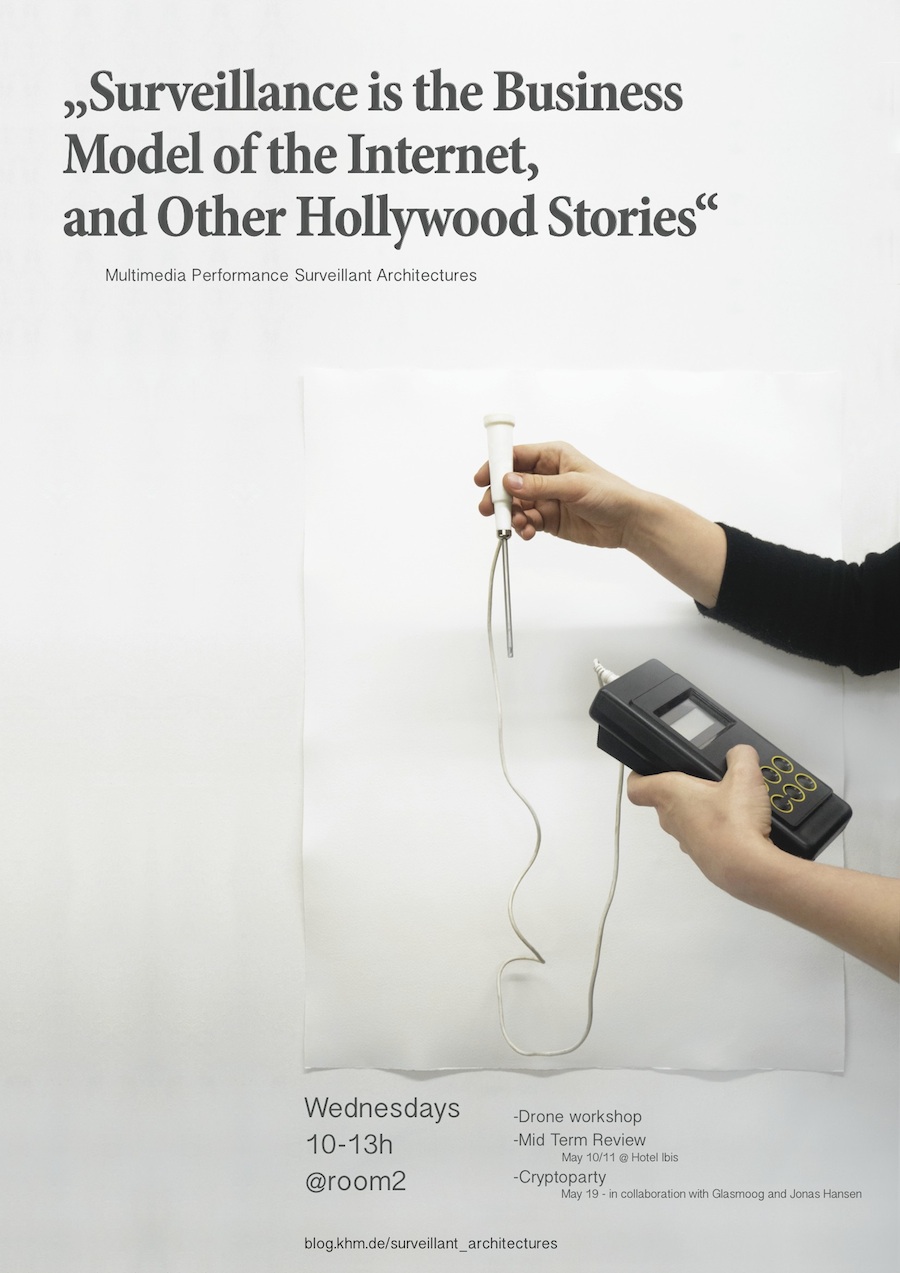
Mid Term Review


Michel Foucault, Discipline and Punish, especially the “Docile Bodies” chapter.
English translation freely available online: https://encrypted.google.com/search?hl=de&q=Michel Foucault Discipline and Punish filetype:pdf
(The German translation: Überwachen und Strafen is in the Semesterapparat, and there is a second copy in the library that you can take home: PHI I.1.2 – 28)
Gilles Deleuze – Postscript on the Societies of Control
Very short essay from 1990, available online, e.g. here or hereGerman translation in the Semesterapparat: PHI C.7 (DEL) – 76
Here’s a 20 minute video explaining the core concepts: https://www.youtube.com/embed/GIus7lm_ZK0 (try to ignore the background music and it’s pretty good)
Giorgo Agamben: What is an Apparatus?
PDF available online: https://duckduckgo.com/?q=Giorgio+Agamben+-+What+is+an+Apparatus
German translation: Was ist ein Dispositiv? in the Semesterapparat: PHI I.1.2 – 58
“According to the philosopher Giorgio Agamben, “subjectivity” is the result of an encounter between “living beings” and the “apparatus”—which he defines, following Michel Foucault, as technologies that possess the power “to capture, orient, determine, intercept, model, control, or secure the gestures, behaviours, opinions, or discourses of living beings.” Art, according to the approach of Nervous Systems, possesses in turn the power to release life from these apparatuses of capture—even if only for moments and in the imagination—thus undoing the current drift toward ever-greater systemic closure. It is in this realm that we can begin to assemble the fragments of lived experience historically, in order to observe the transformations of “the social” in the present, and the frontiers of its subsumption.
(from the introduction to the Nervous Systems catalogue, see below)
Nervous Systems exhibition 2016 @ HKW, Introductory essay in the catalogue
by Anselm Franke, Stephanie Hankey and Marek Tuszynski
The essay is freely available online from HKW
The entire catalogue is in the Semesterapparat: KUN B.6.14 – 813

poster by Nikolai

technology is progressing – now one plane is enough for a constant CCTV stream of every street from above:
“Watch This Surveillance Master Dissect a Murder From the Sky” https://www.bloomberg.com/news/articles/2016-08-23/watch-this-surveillance-master-dissect-a-murder-from-the-sky
“surveillance master” – !?!!!?!!!!
great video effects I’d say. Strong analysis tools looking good.
The background story about the technology and where it’s being used:
“Secret Cameras Record Baltimore’s Every Move From Above” https://www.bloomberg.com/features/2016-baltimore-secret-surveillance/
new words learnt:
“image exploitation”
“circle of persistence”
sales pitch:
“watch here… and here… and here… and here…”
more images provided the company: https://www.google.de/search?tbm=isch&q=site:www.pss-1.com


Our 4th Cryptoparty went really well. A full house and everyone involved learnt a lot. For notes and some quick links for an intro to digital self defence see https://tinyurl.com/cryptokhm
for those that missed today’s seminar, here are my notes and some links
as an example of a corporation that needs to intimately get to know you. They ask questions to get a (good enough) image of who you are, so they can recommend the right match.
Try it, just sign up https://www.okcupid.com (but use a temporary email and I’d say not when logged in to your everyday browser. I did it via Tor and using Spamgourmet https://www.spamgourmet.com/index.pl?languageCode=EN )
Here’s another way to flesh out your digital double: https://www.okcupid.com/tests/the-are-you-really-an-artist-test
(by the way, here are my results:

So does that mean that first you’d have the Data Doubles falling in love, then the real life yous just have to follow suit?
Some notes on dating algorithms and methodology by Christian Rudder, statistician
http://blog.okcupid.com/index.php/we-experiment-on-human-beings/
“The ultimate question at OkCupid is, does this thing even work? By all our internal measures, the “match percentage” we calculate for users is very good at predicting relationships. It correlates with message success, conversation length, whether people actually exchange contact information, and so on. But in the back of our minds, there’s always been the possibility: maybe it works just because we tell people it does. …”
The result:
“When we tell people they are a good match, they act as if they are. Even when they should be wrong for each other.”
Some more about falling in love: Experimentational Generation of Interpersonal Closeness
A psychological study: You only need to answer 36 questions to establish intimacy and trust. “Love didn’t happen to us. We’re in love because we each made the choice to be.”
Article: http://www.nytimes.com/2015/01/11/fashion/modern-love-to-fall-in-love-with-anyone-do-this.html
Paper: http://psp.sagepub.com/content/23/4/363.full.pdf+html
“I first read about the study when I was in the midst of a breakup. Each time I thought of leaving, my heart overruled my brain. I felt stuck. So, like a good academic, I turned to science, hoping there was a way to love smarter”
Read: a way to make love safer and more convenient (the drive behind all of this IMHO).
…
https://www.youtube.com/watch?v=ld9m8Xrpko0
The whole episode is online on Youtube if you want to re-watch. The DVD box set is in our Semesterapparat in the library.
It talks about, among other things, love, death and bereavement. It’s fairly didactic also, in the way it explains the limits of Facebook’s way of constructing your Data Double (i.e. when real-life Ash says he’s sharing the image of himself because it’s “funny” and the Ash the fleshbot then repeats it as face value.)
Charlie Brooker, creator of the series, explains in a panel discussion on the ideas that led to writing this story:
“I was spending a lot of time late at night looking at Twitter, and I was wondering, what if all these people were dead. Would I notice?”
Basically people’s reactions and posts are so formulaic that they’re entirely predictably. So we might as well get a robot to do it.
“Also there is the story of the inventor of one of the first chat bots, Eliza. He had his secretary test her out, and shortly after she asked him to leave, because even though she knew it was a machine she was talking to, she was having a very intimate conversation and wanted to be alone.”
…
So it seems there is a huge market for intimacy with robots out there. Presumably it’s going to become a lot more visible soon. David Levy is a computer scientist who has done decades of research. In his book “Love and Sex with Robots” he recommends sex robots as the solution to many of our problems.
Press response see i.e. https://www.theguardian.com/technology/2015/dec/13/sex-love-and-robots-the-end-of-intimacy
…
The most prominent and profound critic of this development is Sherry Turkle, Professor of Social Studies of Science and Technology at MIT. In her work she focuses on human-technology interaction, and used to praise the Internet for the freedom it gave people in re-inventing themselves, trying out different personas. In recent years she has become increasingly critical of the way that technology limits the depth of human communication and interaction.
See her book “Alone Together” (in the library):
Facebook. Twitter. SecondLife. “Smart” phones. Robotic pets. Robotic lovers. Thirty years ago we asked what we would use computers for. Now the question is what don’t we use them for. Now, through technology, we create, navigate, and perform our emotional lives.
We shape our buildings, Winston Churchill argued, then they shape us. The same is true of our digital technologies. Technology has become the architect of our intimacies.
She starts the book with research about the emotional investment people make in toy robots. Describes how her research again and again has shown that people are more than happy to confide in robots and enter into intimate relationships with them.
People often find that robots are actually preferable to a live person. Unlike real pets, robot puppies stay puppies for ever. Your sex robot will always be young, willing, and only be there for you (and won’t think you have strange desires or are a bad performer). According to Turkle, the problem is that this is a reduction of the bandwidth of human experience as we used to know it. She quotes from her research with teenagers: “texting is always better than talking”, as it’s less risky. Risk-avoidance is at the heart of the desire for intimacy with robots. (Again, security and convenience.)
Interaction with robots is sold as “risk free”, whereas “Dependence on a person is risky – it makes us subject to rejection – but it also opens us up to deeply knowing each other.”
“The shock troops of the robotic moment, dressed in lingerie, may be closer than most of us have ever imagined. … this is not because the robots are ready but because we are.”
It’s in the library! From the introduction to the book: http://alonetogetherbook.com/?p=4
A quick TED talk about the ideas and research behind the book: TEDxUIUC – Sherry Turkle – Alone Together: https://www.youtube.com/watch?v=MtLVCpZIiNs
…
A talk by Gemma Galdon-Clavell https://www.youtube.com/watch?v=0eifMYCfuBI. My rough notes:
“who do you think you are? who do you think the person next to you is? …
identities are a complex thing. we mess with our identities, we play with them, we’re not the same person at a job interview than when going out at night to party. we choose to show different things, evolve over time.
data: fixes things. States need fixed things.
not too long ago, the amount of personally identifiable data (PII) was limited. when you crossed a border. when you registered a car. when you got a speeding ticket. that kind of info got stored by the state. back then only the state was big enough to need a UID to track you.
now: is stored by a large number of actors: shopping (loyalty cards, credit cards), entertainment (video streaming “rental”, music streaming, online game platforms), social media (making up ~60 to 75% of total traffic), smart phones (full of sensors & apps. have sensors than can be used for more than you can imagine )… we leave data traces all the time and we have no control. we have no way of knowing where the data goes, it gets sold on, or is held in storage silos because people think it’s tomorrow’s oil. Companies might even not know what to do with it, but they gather it anyway now. They keep it just in case.
Data doesn’t just sit there but it’s being used in new and dynamic ways, all to build a model of you that is as exact as possible: the Data Double. You, in data. When you enter any business transaction with companies, they don’t make decisions on you, but on what they can learn about you from their databases. You think you’re sitting down with your banker, talking about that loan, but really the decision that he’s going to make is based on your credit scoring. Not how compelling you are in presenting your ideas. The score is presented to them in a color, they’ll just see a green or red light, and won’t even be able to find out how that rating came about. You’re trying to create an interaction, and the decision has been made beforehand. Same with web sites who decide how to interact with you based on the cookies in your browser.
example dating site: answer a few questions (this is usually done by cookies on other web sites). Based on those the dating site will decide who you are and provide recommendations what to avoid and what to look out for. So the data double is not only a representation of yourself, but it’s also shaping your future self, because suddenly your options have reduced drastically, and your perspective has narrowed.
states love data doubles, because it’s a lot easier to deal with data than it is to deal with people. People are complex, messy, can be annoying. Data is stable, fixed, doesn’T yell back at you. High temptation to substitute people with data (“The data gives me a good idea of what the people want that I represent in parliament”)
Increasing pressure to conform to the image that the data has about me. Example credit card fraud detection: do something unusual and it’ll flag it as probably fraudulent and won’t allow it.
Ends with: can I ever get out of this cage again? Does the data double forget? Forgive? (doesnt look like it). So: until we have the legal tools to deal with this direclty and fairly, the solution is sabotage. only give up data if it profits you.
Bottom line: most of it is being used for either advertising and/or prediction. To read more about the details, see i.e. here: Epic.org: Privacy and Consumer Profiling.
Come to our Cryptoparty on May 19 to learn about self-defense measures.


thanks, Steffi, for another great poster!
Shoshana Zuboff on how we became Google’s slaves. A must-read.
Big other: surveillance capitalism and the prospects of an information civilization Update: Joscha sent in a better link: The Secrets of Surveillance Capitalism
German translation: Überwachungskapitalismus
Nearly 70 years ago historian Karl Polanyi observed that the market economies of the 19th and 20th centuries depended upon three astonishing mental inventions that he called fictions. The first was that human life can be subordinated to market dynamics and be reborn as labor. Second, nature can be subordinated and reborn as real estate. Third, that exchange can be reborn as money. The very possibility of industrial capitalism depended upon the creation of these three critical fictional commodities. Life, nature, and exchange were transformed into things, that they might be profitably bought and sold. The commodity fiction, he wrote, disregarded the fact that leaving the fate of soil and people to the market would be tantamount to annihilating them.
With the new logic of accumulation that is surveillance capitalism, a fourth fictional commodity emerges as a dominant characteristic of market dynamics in the 21st century. Reality itself is undergoing the same kind of fictional meta-morphosis as did persons, nature, and exchange. Now reality is subjugated to commodification and monetization and reborn as behavior. Data about the behaviors of bodies, minds, and things take their place in a universal real-time dynamic index of smart objects within an in finite global domain of wired things. This new phenomenon produces the possibility of modifying the behaviors of persons and things for profit and control. In the logic of surveillance capitalism there are no individuals, only the world-spanning organism and all the tiniest elements within it.
Another good critique of the ideology behind CCTV: Esther Hovers’ series False Positives
“The omnipresent gaze? Surveillance between visibility and the management of norms.”
Guest lecture by Dr. Nils Zurawski
Institut für kriminologische Sozialforschung at Uni Hamburg,
founder of the Surveillance Studies network
www.surveillance-studies.org
Wednesday, 13 January 2016
Surveillant Architectures Group
room 2, Filzengraben 2a
KHM Cologne
Upcoming conference in Barcelona: http://www.surveillance-studies.net/?p=1162